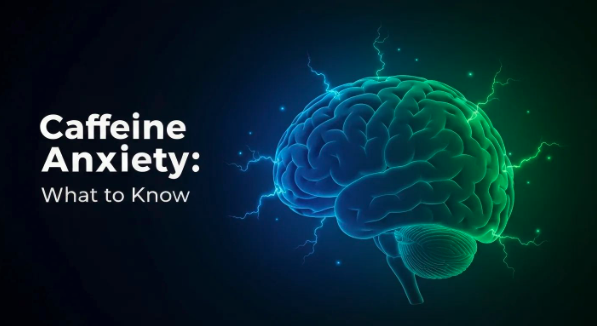Detecting Early Signs of Anxiety in Teens
Learn recognizing early signs of anxiety in teens, from behavioral changes to coping strategies for support.

Understanding Teenage Anxiety
Anxiety is a common experience during adolescence, shaped by a variety of factors unique to this developmental stage. Recognizing early signs of anxiety in teens involves understanding how it manifests differently compared to childhood anxiety and identifying the triggers that lead to these feelings.

Key Differences from Childhood Anxiety
Anxiety in teenagers often differs significantly from anxiety experienced during childhood. Anxious teens are more likely to focus on their personal worries, which can encompass concerns about academic performance, participation in sports, social perceptions, and body image. These worries can manifest as perfectionism and issues related to self-esteem [1].
During adolescence, physical changes associated with puberty can trigger anxiety, particularly if a teen develops at a different pace than their peers. Teens might also face more complex social situations compared to children, which can increase feelings of anxiety. While some teens may have experienced anxiety from a young age, others may find it develops newly during these years, presenting in forms such as social anxiety or panic attacks.
Age GroupCommon WorriesChildhoodSeparation from parents, fear of the dark, school issuesAdolescenceAcademic performance, peer acceptance, body image
Triggers and Manifestations
The emotional, physical, and social changes that occur during adolescence contribute to a heightened susceptibility to anxiety. Teens might encounter pressures from various sources, including school expectations, social dynamics, and internalized standards of success [2].
Anxiety disorders typically arise from a combination of biological and environmental influences. These disorders are more prevalent in girls than boys and can involve multiple types of anxiety simultaneously. The three most common anxiety disorders found in adolescents include separation anxiety, social anxiety, and generalized anxiety disorder (GAD) [3].
Teens may exhibit a range of symptoms, including physical manifestations such as tension, rapid heartbeat, or headaches, alongside behavioral changes like withdrawal from social situations or decreased academic performance. Awareness of these triggers and symptoms can help parents and guardians better support their teens in managing anxiety effectively. For additional insights on how to support teenagers with anxiety, consider exploring our resources on building resilience against anxiety and anxiety triggers: identifying and managing them.

Recognizing Signs of Anxiety in Teens
Detecting anxiety in teenagers can be challenging, as symptoms may manifest in a variety of ways. The following sections explore behavior modifications, physical symptoms, and coping mechanisms indicative of anxiety in adolescents.
Behavioral Changes
Teenagers experiencing anxiety may display noticeable changes in behavior. Common signs include:
Teens often conceal their feelings, which makes identifying these behavioral changes crucial for early intervention.
Physical Symptoms
Physical manifestations of anxiety are also prevalent in teenagers. Some of the common symptoms include:
Physical SymptomDescriptionStomachachesFrequent complaints of abdominal pain, often linked to stress.HeadachesRegular tension headaches due to stress.FatigueChronic exhaustion that doesn’t improve with rest.Sleep DisturbancesDifficulty falling asleep or staying asleep due to racing thoughts.
Many teens may complain of these physical symptoms as a way to express their anxiety indirectly, thereby complicating diagnosis and treatment.
Coping Mechanisms
To manage anxiety, teenagers might resort to various coping mechanisms. It is vital to recognize which methods may be harmful or ineffective, including:
While some coping strategies may provide temporary relief, healthier alternatives should be encouraged, such as calming techniques for anxious moments, to address the root causes of anxiety.
Understanding these signs and symptoms plays a critical role in recognizing early signs of anxiety in teens. Early intervention can provide necessary support and resources to help adolescents navigate their anxiety more effectively.

Impact of Anxiety on Teens
Anxiety in teenagers can have significant ramifications on various aspects of their lives. It can influence their behaviors, mental health, and long-term outlook. Understanding these impacts is essential for recognizing early signs of anxiety in teens.
Link to Substance Use
Many teens coping with anxiety may turn to substances like marijuana or alcohol as a method of self-medication. While these substances may provide temporary relief from anxiety symptoms, they can lead to dependency in the long run [1]. It is critical to address these coping mechanisms early, as substance use can complicate anxiety disorders and introduce additional health risks.
Substance TypeReason for UsePotential RisksMarijuanaTemporary relief from anxietyDependency, worsened anxiety symptomsAlcoholSocial easing, numbing effectDependency, risk of alcohol abuse
Adolescents who resort to recreational drugs may not develop healthier coping strategies, further exacerbating their anxiety issues. Recognizing this behavior is vital for effective intervention.
Connection with Depression
There is a strong link between anxiety and depression in teenagers. An anxious lifestyle can limit opportunities for social interactions and personal growth, leading to feelings of helplessness and depressive symptoms. Even though anxiety and depression can occur separately, they often co-occur, making it challenging to diagnose and treat [1]. Generalized Anxiety Disorder (GAD) is particularly associated with increased rates of depression as the individual ages.
The interconnectedness of these two disorders underscores the importance of recognizing anxiety early, as untreated anxiety can pave the way for depressive episodes.
Disorder TypeCommon SymptomsAssociated RisksAnxietyIrritability, avoidance, headachesDevelopment of depression, social isolationDepressionPersistent sadness, fatigue, lack of interestWorsening anxiety, risk of self-harm
Long-term Effects
The long-term impact of anxiety can extend well into adulthood. Chronic anxiety may lead to persistent mental health issues, problems in social and occupational domains, and an increased likelihood of developing other psychological disorders. Those who experienced significant anxiety during their teen years have a higher probability of facing challenges like depression or substance use disorders later in life [1].
Early intervention is critical for mitigating these long-term effects. Strategies such as Cognitive Behavioral Therapy (CBT) can assist in managing anxiety in teens, laying the groundwork for healthier coping mechanisms and reducing the risk of subsequent mental health issues. Support from family and friends is equally important for long-term management.
Understanding these impacts is crucial for parents, educators, and mental health practitioners to foster healthier outcomes for teens struggling with anxiety.
Strategies for Managing Teenage Anxiety
Managing anxiety in teenagers requires a multi-faceted approach. Effective strategies often combine therapy, medication, and open communication.
Cognitive Behavioral Therapy (CBT)
Cognitive Behavioral Therapy (CBT) is the recommended treatment for anxiety in teenagers. This therapeutic approach helps adolescents change their thinking patterns and reactions to anxiety-inducing situations. CBT teaches teens strategies to confront their anxiety rather than avoid it, highlighting that anxiety tends to decrease over time as they learn coping mechanisms.
CBT is particularly beneficial because it includes techniques like exposure therapy, which gradually reduces anxious responses. Through consistent practice, teens can learn to modify dysfunctional behaviors and emotions tied to their anxiety [3].
Component of CBTDescriptionCognitive RestructuringChanging negative thought patternsBehavioral ActivationEngaging in activities that bring joy and fulfillmentExposure TherapyGradual confrontation of feared situations
Role of Antidepressant Medication
In certain instances, antidepressant medication, particularly Selective Serotonin Reuptake Inhibitors (SSRIs), may be combined with CBT for teenagers who struggle to engage in therapy alone due to severe anxiety [1]. Medication can serve as a supportive tool to alleviate anxiety symptoms and facilitate participation in therapy.
It's important for parents and guardians to consult with healthcare professionals to assess the appropriateness of medication for their teen. Monitoring effectiveness and side effects is crucial to ensure the best outcomes.
Medication TypeCommon UsageNotesSSRIsAnxiety & depressionOften prescribed for teensSNRIsGeneralized Anxiety DisorderMay have unique benefitsDosageVaries by individualRequires careful medical supervision
Importance of Communication
Effective communication is vital in supporting a teenager with anxiety. Open dialogue encourages teens to share their feelings and experiences without fear of judgment. Parents and caregivers should foster an environment where discussing anxiety is normalized.
Listening and validating their concerns can help teens feel understood and supported. Additionally, guiding them toward discussing their feelings with professionals can foster a more comprehensive approach to managing their anxiety.
Encouraging teens to articulate their feelings opens the door to healthy coping strategies, such as practicing stress-reducing techniques or establishing relaxation exercises.
By implementing CBT, considering medication when necessary, and enhancing communication, parents and caregivers can provide effective support for teens grappling with anxiety. These strategies are essential in recognizing early signs of anxiety in teens and fostering resilience against its challenges.
Common Anxiety Disorders in Teens
Understanding the various anxiety disorders that can affect teenagers is vital. Recognizing early signs of anxiety in teens can lead to effective management and support. Here are three common anxiety disorders that teens may experience: Social Anxiety Disorder, Separation Anxiety Disorder, and Generalized Anxiety Disorder (GAD).
Social Anxiety Disorder
Social Anxiety Disorder (SAD) is characterized by a significant fear of being judged or embarrassed in social situations. This fear can lead to avoidance of various social experiences, such as gatherings, performances, or even school activities. Teens may feel overly anxious about their interactions, worrying that others are scrutinizing their behavior or appearance. This can severely impact their social life and lead to isolation.
Key Features of Social Anxiety DisorderIntense fear of social situationsAvoidance of social interactionsPhysical symptoms like sweating or trembling in social settings
Separation Anxiety Disorder
Separation Anxiety Disorder (SAD) is often seen when a teen worries excessively about being apart from caregivers or loved ones. This disorder can manifest in symptoms such as clinginess, distress during separations, or fears that something bad will happen to loved ones when apart. It can interfere with a teen's ability to attend school or engage in activities independent of their caregivers [4].
Symptoms of Separation Anxiety DisorderExcessive distress during separationExcessive worry about potential harm to attachment figuresPhysical complaints like headaches or stomachaches when facing separation
Generalized Anxiety Disorder (GAD)
Generalized Anxiety Disorder (GAD) involves chronic worrying about multiple aspects of life, such as academics, relationships, and health. This disorder is particularly concerning as it is linked to a higher risk of developing depression in adulthood. Teens dealing with GAD often feel overwhelmed by everyday situations, which can lead to difficulties in concentration and disruptions in daily activities.
Characteristics of Generalized Anxiety DisorderPersistent worry across various life domainsDifficulty controlling the worrySymptoms may include restlessness, fatigue, and irritability
Understanding these anxiety disorders is crucial for parents, educators, and caregivers. Early identification and intervention can significantly improve a teen's quality of life and mental well-being. For more on coping strategies, visit our resources on managing chronic worry and dealing with nervousness in social settings.
Seeking Help for Teenage Anxiety
Finding appropriate assistance for teens struggling with anxiety is crucial for their overall well-being. Understanding the options available and encouraging a supportive environment can lead to better outcomes.
Professional Treatment Options
Professional help often plays a significant role in managing anxiety in teenagers. Cognitive Behavioral Therapy (CBT) is widely recognized as the most effective treatment for anxiety in this demographic. It helps teens develop strategies to confront their anxieties rather than avoid them, demonstrating that these feelings can lessen over time. Exposure therapy, a subset of CBT, gradually reduces anxious responses [1].
A comprehensive treatment plan may involve various health professionals, including doctors, psychiatrists, psychologists, or counselors. Treatment options could also include medications, personalized care, and lifestyle adjustments to provide a well-rounded approach to managing anxiety.
Treatment OptionDescriptionCognitive Behavioral Therapy (CBT)Teaches teens ways to face their anxietyAntidepressant MedicationMay be combined with therapy for some individualsLifestyle AdjustmentsIncorporating exercise and nutrition changes
Support from Family and Friends
The role of family and friends is essential in supporting teens with anxiety. Open communication can create a safe space for teens to express their feelings and fears. Families can help by being educated about anxiety disorders, understanding triggers, and encouraging healthy coping mechanisms.
Friends can also provide emotional support. Engaging in activities together can serve as a distraction and help alleviate feelings of isolation. For more effective strategies, refer to our article on supporting a loved one with anxiety.
Long-term Management
Managing teenage anxiety is often a long-term process. Possible long-term strategies may include continuing therapy, practicing calming techniques for anxious moments, and making necessary lifestyle changes to reduce stress. For example, incorporating regular exercise can help combat anxiety, while also focusing on adequate nutrition can further support mental health [6].
Additionally, teens should be encouraged to build resilience against anxiety. By recognizing anxiety triggers: identifying and managing them, they can develop personalized coping strategies. Providing a structured approach to managing anxiety promotes independence and self-confidence, making it easier for teens to face future challenges.
References
[2]:
[3]:
[4]:
[5]:
[6]:
More Resources
A team ready to start your journey.
Get in touch — today.
We are a safe space – a haven for exceptional individuals to receive discreet, personalized, in-person treatment and care.
.avif)



.webp)






